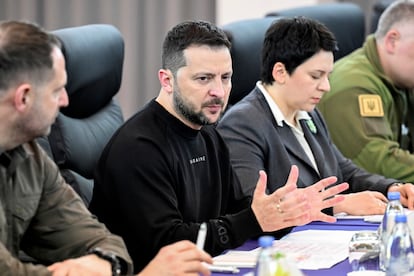Zelenskiy courts non-aligned countries at G-7 summit
The Ukrainian president hoped to persuade Indian Prime Minister Narendra Modi and Brazilian President Luiz Inácio Lula da Silva to change their position on the war in Ukraine


On the third and final day of the G-7 summit in Hiroshima, Japan, Ukrainian President Volodymyr Zelenskiy aimed to secure more support from Ukraine’s allies, and to persuade the leaders of the non-aligned countries present at the meeting — India, Brazil and Indonesia — to reconsider their position.
U.S. President Joe Biden on Sunday announced a new $375-million military aid package for Ukraine that will include ammunition, artillery and armored vehicles. The announcement comes after Washington agreed — after months of reluctance — to allow the delivery of F-16 fighter jets to the embattled country. On Friday, Biden gave the green light for a program to train Ukrainian pilots. And on Saturday, his National Security Advisor, Jake Sullivan, provided more information, clarifying that in the coming months a decision will be made on who will deliver the planes, how many will be delivered, and when. British Prime Minister Rishi Sunak said that training will begin this summer.
The G-7 summit took place as fighting intensified in Ukraine. Russia’s defense ministry reported that forces of the Wagner private army, with the support of Russian troops, had seized the eastern town of Bakhmut, which has been the site of one of the longest battles of the war. According to Russian media, Russian President Vladimir Putin congratulated the armed forces for the alleged victory in Bakhmut.
Before the start of a bilateral meeting with Biden, Zelenskiy mentioned the situation in the eastern town. When asked: “is Bakhmut still in the hands of Ukraine? The Russians say they have taken it,” he replied: “I think not.” But it was not clear whether he was responding to the question or to Russia’s claim that it had taken control of the city. Zelenskiy said the Russians had destroyed “everything.” “You have to understand that there is nothing,” he said. “For today, Bakhmut is only in our hearts,” he said. “There is nothing in this place.” This appeared to suggest that Ukraine had given up Bakhmut as lost. Later, however, a spokesperson for the Ukrainian president clarified that when Zelenskiy responded “I think not,” he was saying he did not think that Russia had taken control of the city.
Zelenskiy and his Western partners were placing a lot of importance on the meetings with non-aligned leaders. The Ukrainian president met with Indian Prime Minister Narendra Modi, Brazilian President Luiz Inácio Lula da Silva and Indonesian President Joko Widodo — the leaders of three countries which have maintained economic and political relations with Moscow.
While it was unlikely that these key players would suddenly shift their position, Zelenskiy and his Western partners were hopeful that personal contact, direct explanations and arguments based on the United Nation’s founding values, such as respect for a country’s sovereignty and territorial integrity, would influence the non-aligned leaders’ internal reasoning.
“This war isn’t just European. It’s the opportunity to discuss, exchange and convince partners of this enlarged G7... India, Brazil, Indonesia and several other countries from the south, who have sometimes not exchanged as much with Ukraine,” French President Emmanuel Macron said on Sunday. “This allows Zelenskiy to express himself to powers of the world who at times are exposed to just one discourse. And I say that just a few weeks before a BRICS summit,” Macron said, referring to the grouping of Brazil, Russia, India, China and South Africa.
Zelenskiy’s visit to the G-7 summit was not publicly announced until a few hours before his arrival. European sources indicate, however, that the Japanese presidency had informed all delegations in advance, including those of countries outside the G-7. All of them were aware that they would meet the Ukrainian leader in Hiroshima.
India and Brazil are of particular importance for Ukraine. India is important since due to historical reasons it maintains deep ties with Moscow, and its goodwill is an important booster for the Kremlin. The Modi government abstained from the U.N. vote on the Russian invasion and has a flourishing oil deal with Russia, but it also has sent quite explicit messages against Russia’s aggression un Ukraine and has some interest in aligning with the West over its concern about China.
Brazil is important for different reasons. While the country does not have the economic standing or political influence to influence the war in Ukraine, Lula is a popular leader, who is admired by progressive voters and has a wide network of personal contacts across the world. For months, he has been working to start peace negotiations between Ukraine and Russia.
However, before he was elected president, Lula told Time magazine that Zelenskiy was just as responsible for the conflict as Putin. In other statements, he has said that it is no use saying “who is right” in the conflict. Brazil is not sitting on the fence: it opposes the invasion, but Lula’s statements have triggered a lot of skepticism.
The G7 leaders rolled out a new wave of global sanctions on Russia, now the most-sanctioned country in the world, as well as plans to enhance the effectiveness of existing financial penalties meant to constrain President Vladimir Putin’s war effort.
The latest sanctions aimed at Russia include tighter restrictions on already-sanctioned people and firms involved in the war effort. More than 125 individuals and organizations across 20 countries have been hit with U.S. sanctions.
Sign up for our weekly newsletter to get more English-language news coverage from EL PAÍS USA Edition
Tu suscripción se está usando en otro dispositivo
¿Quieres añadir otro usuario a tu suscripción?
Si continúas leyendo en este dispositivo, no se podrá leer en el otro.
FlechaTu suscripción se está usando en otro dispositivo y solo puedes acceder a EL PAÍS desde un dispositivo a la vez.
Si quieres compartir tu cuenta, cambia tu suscripción a la modalidad Premium, así podrás añadir otro usuario. Cada uno accederá con su propia cuenta de email, lo que os permitirá personalizar vuestra experiencia en EL PAÍS.
¿Tienes una suscripción de empresa? Accede aquí para contratar más cuentas.
En el caso de no saber quién está usando tu cuenta, te recomendamos cambiar tu contraseña aquí.
Si decides continuar compartiendo tu cuenta, este mensaje se mostrará en tu dispositivo y en el de la otra persona que está usando tu cuenta de forma indefinida, afectando a tu experiencia de lectura. Puedes consultar aquí los términos y condiciones de la suscripción digital.








































